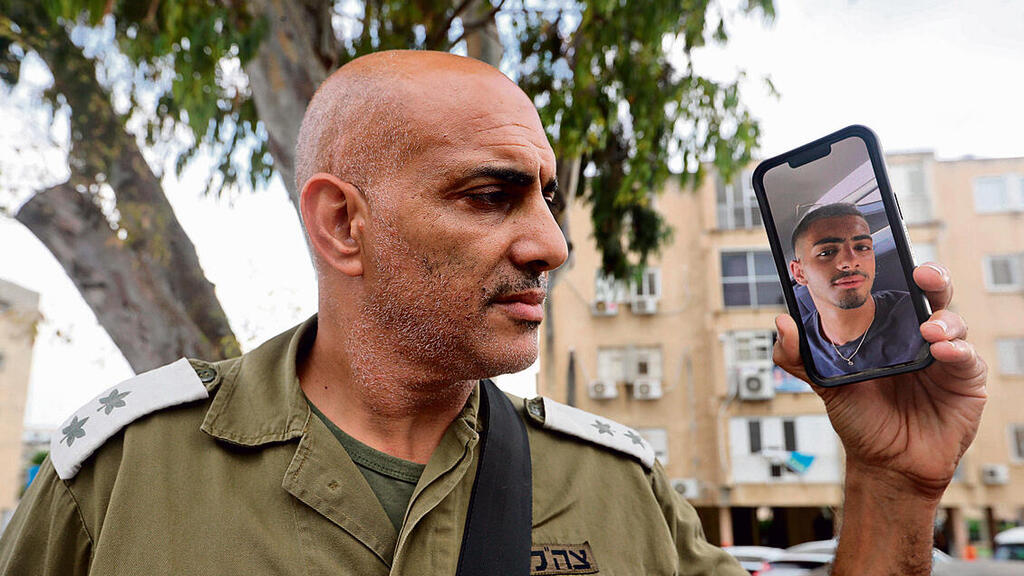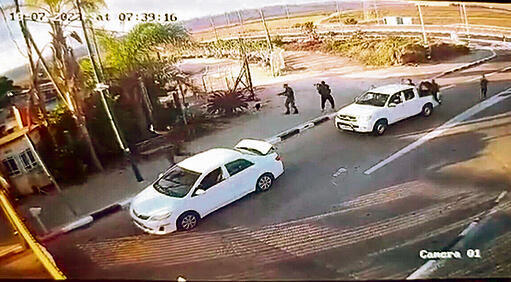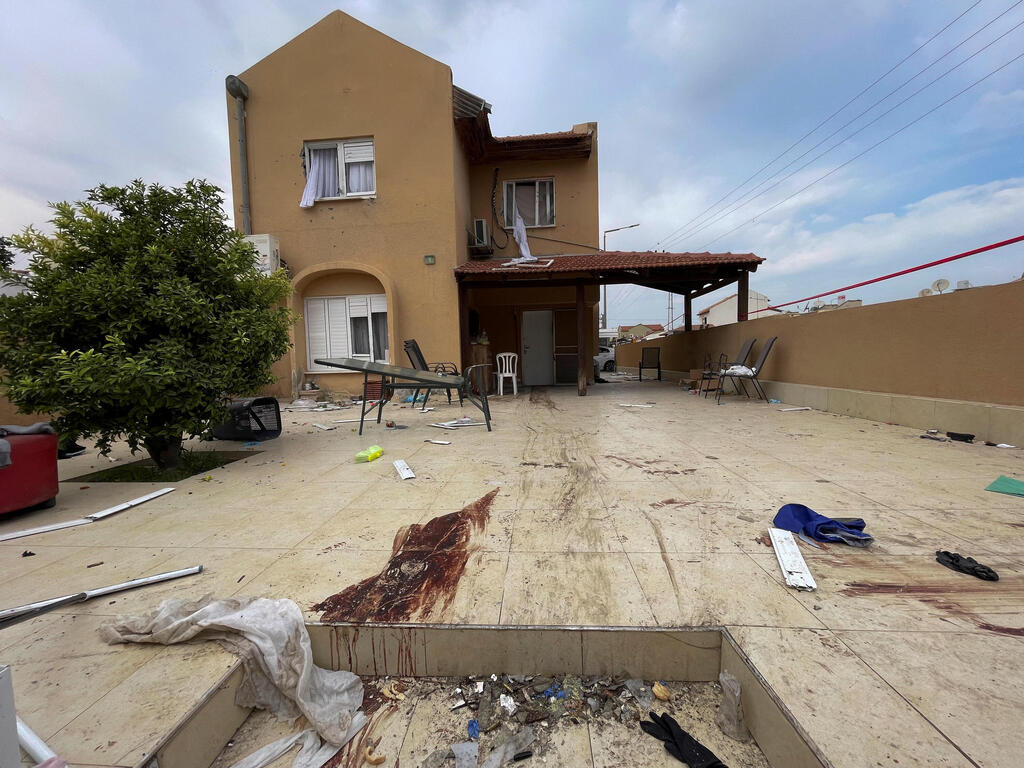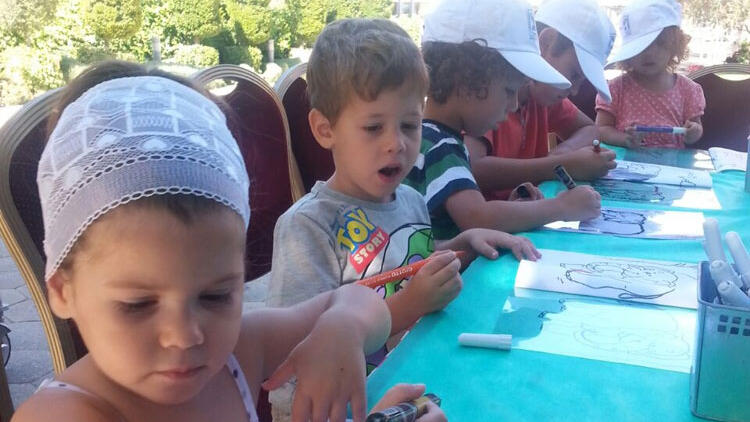Getting your Trinity Audio player ready...
The elementary school transformed into a military base overnight, with reservists' cars occupying every available space. The background soundtrack resembles scenes from a war movie, punctuated by occasional echoes of explosions from air force strikes in Gaza. The ground trembles when a rocket lands on a serene street in Ashkelon, just a few hundred meters away.
Read more:
Amidst this turmoil, Lt. Col. Hajbi appears resilient and composed. Seeing him in his uniform, sunglasses, and carrying a short M-16 rifle, it's challenging to believe that just two days earlier, his world had been shattered. His son, the late 18-year-old Yonatan Hajbi, was tragically killed by a terrorist in Moshav Yachini during the early hours of the Hamas attack. Despite this profound loss and anguish, the grieving father voluntarily took charge of the 7109 battalion of the Daniel Brigade in the reserves.
The battalion, tasked with safeguarding the Ashkelon coastal sector, faced its first major challenge on the second day of the war. During an encounter with terrorists near the Tenth Route, one of the soldiers was killed, and six others were wounded. Hajbi, who has lost several friends and subordinates since joining Golani about 30 years ago, visited the injured soldiers at Sheba and Beilenson hospitals.
"I walked into the hospital room where one of my soldiers was recovering after being shot", he shared. "Despite his injuries, he was doing fine. Outside, I found his wife in tears. I asked her gently, 'Why are you crying?' she replied, 'Because my husband is injured'. I probed further, 'But is he talking? Is he functioning?' she nodded, and I added, 'My son was murdered just two days ago'. Sympathetically, she said, 'Oh, I'm so sorry'. I comforted her, 'You have nothing to apologize for. I understand your pain, but it could have been much Worse'. I hugged her, and she said, 'You're right', she acknowledged, and the tears subsided. Then, unexpectedly, she said, 'You're like King David, who buried his son and went to war'. I cautioned her, 'Let's not draw that comparison too closely'."
Still, your response was nearly beyond comprehension. How did you find the strength and muster the energy to join the reserves just one day after losing your son?
"I don't believe I possess extraordinary abilities. My perspective has always been let's focus on actions that can make a difference. Currently, I can't bury my son, and sitting at home, mourning, won't propel me forward. When you witness the chaos, destruction, and magnitude of the disaster, along with the public's mobilization, you realize the importance of being present. I've chosen to set aside my personal anguish momentarily to fight for our country and secure a victory. After Yonatan's funeral, I will find the time to mourn my personal loss."
"Yonatan, stay: your father stands beside you"
At the age of 49, this father of five spent the majority of his life in Moshav Yachini near Sderot. Following his divorce, he relocated to Kibbutz Kisufim on the Gaza border. By the end of 2018, he concluded his lengthy military service, during which he served as a fighter and commander in the Golani Brigade, the operations officer of the Gaza Division, and the head of the frontline branch in the Southern Command. The day after retiring from the army, he was appointed as a reserve battalion commander. In his civilian life, he works as the operations manager for the military training camp -in Bahadim city, on behalf of the company "Natoon Operation & Maintenance."
When the tragedy unfolded, Hajbi was on vacation abroad with his partner, Moran. "We flew to Baku last Thursday, and on Saturday at 6:30 in the morning, I received a notification on the app: red alert in Kibbutz Kissufim. I thought, well, we're accustomed to it. Yet, something felt odd this time, it happened suddenly, without any warning. After a while, messages started pouring in on the kibbutz groups. Someone mentioned being in the secure room and hearing gunshots outside. People were saying, 'they are knocking on our door'. Then, someone typed, 'I've been shot!' it became clear we were facing a major security incident."
"I reached out to people while also texting my children, who live in Yachini with my ex-wife: 'is everything okay?' My two daughters, staying with us in Kisufim, were off on a trip to Crete with their grandparents, so I wasn't overly concerned about them. Knowing Yonatan's religious observance of the Sabbath, I understood he might not answer his phone. When there was no response, I called my older son, Ben-Zion, and asked what was happening. He told me, 'Dad, we're in the residential secure room. There are terrorists at the entrance to the Moshav, our cooperative Israeli settlement. Yonatan has been injured, but we don't know his condition'."
"I realized Yonatan was at my mother-in-law's parents' house. I called his grandfather, frantic for information. 'Listen', he said urgently, 'Yonatan is wounded, a bullet in the chest, and there's no one here to help. We can't get any assistance'. Picture the situation: I was told my son's life was hanging by a thread, there were terrorists in the Moshav, and I couldn't contact the Magen David Adom, Israel's national rescue organization, or rush him to a hospital. I was stuck in a hotel in a foreign country, utterly powerless. If I were in Israel, I would have moved heaven and earth to reach him and save him, even if it meant risking my own life. That's what a father does. Terrorists or not, it didn't matter to me. I had saved my soldiers before; I had fought for them. So, for my own son, how could I not fight? Yet, at that crucial moment, I wasn't there for him."
The only option left for him was to reach out desperately to everyone he knew. "I called all my friends from the army and pleaded with them: 'Please, go to Moshav Yachini, save my son!' I contacted my fellow officers from the battalion, spoke with officers from the division and the southern district, reached out to my brigade general, and even called colleagues from work. But there seemed to be no way to reach him. His grandfather informed me over the phone that my ex-wife's sisters, one of whom is a nurse, were attempting to save him. However, three hours had passed, and his condition was deteriorating rapidly. He was losing blood, starting to lose consciousness, and the grandfather said, 'listen, if no one arrives soon, the boy won't make it'."
Hamas terrorists attack Moshav Yakhini
Can you depict for me the emotions you experienced in those moments?
"Imagine this overwhelming feeling of helplessness. Throughout my life, I've dedicated myself to the country's security, risking my life countless times. Yet, when it came to my son, the most precious thing in the world to me, no one could help. Simultaneously, I realized there was immense chaos, and an event of a magnitude we hadn't anticipated was unfolding. Yonatan wasn't the only one in need of rescue. In my role as a battalion commander, I have faced situations where three or four events were unfolding simultaneously, compelling me to make strategic decisions based on priorities. I understood the army hadn't deliberately abandoned him. Why didn't they come? because the event transpired on a broader scale than we had anticipated or were adequately prepared for."
Where was his mother at the time?
"In her house, just 300 meters away from his grandparents' place. But she was helpless too. 'Save my child', she implored, clutching him tightly. I whispered to him, 'Yonatan, don't leave. Your father is here. Always by your side'. I could feel him telling me, 'Dad, I'm ascending', demonstrating the motion with his hands, his voice thick with tears. 'Several times, it felt like he was slipping away, and I desperately pulled him back. Until, at one heartbreaking moment, I had to let go. I knew it was his time. I didn't wait for confirmation. I tore my shirt and uttered, 'Blessed be the True Judge,' the age-old words uttered upon hearing of a death. And after a while, they confirmed that he…"
Lieutenant Colonel Hajbi finds himself unable to finish this sentence.
"I sent a message to the officer: 'Enlist me'."
"I had to ensure the safety of my family"
The journey back to Israel, a mere few hours away by direct flight, turned into an ordeal lasting almost a day. "Friends suggested going through Turkey. Upon reaching the airport, we were informed that the flight to Istanbul was leaving in half an hour, at three, and all seats were occupied. I told my partner, 'I need a moment alone, please handle the situation'. She spoke to a Turkish security officer. I'm not sure how she managed to persuade him, but two passengers were removed from the flight, and we were allowed to board. Once in Turkey, I looked for a flight to Israel, but flights were already being canceled due to the ongoing war. Buy tickets here - they get canceled. Buy tickets there - they get canceled."
"I can't explain how fate led me to encounter this Turkish man working at the airport, but from that moment onward, he stayed by my side for an hour and a half, navigating from one airline to another. However, it was already midnight, and there were no available flights. Feeling helpless, I reached out to friends who connected me with the Israeli consulate in Istanbul. They welcomed us into their home, promising to assist us. True to their word, they ensured we secured a flight back to Israel. Finally, on Sunday at half past two in the afternoon, we landed safely in Israel."
Upon landing, Hajbi immediately contacted the individual overseeing the body collection point in Netivot, where his son's remains were taken. "May I see my son?" he inquired. The response came grimly, "Due to the chaos, you can't reach Netivot".
Understanding the situation, Hajbi asked, "Does that mean there won't be a burial now?" the answer was bleak, "There won't be a burial in the coming days."
Frustrated, he messaged his liaison officer, stating, 'Enlist me; I'm on my way.' Shortly afterward, his eldest son and ex-wife urgently phoned, pleading, "We're in the Moshav. We can't leave yet; we need to get out of here. Please come and rescue us."
"I drove directly from Tel Aviv to Ashkelon. While en route, I instructed the battalion members to assemble a team comprising several officers and two vehicles to accompany me back to the Moshav. They understood the gravity of the mission: a grieving general, having lost his son, now embarking on a mission to rescue the rest of his family. I am proud to have a battalion filled with champions. We quickly organized uniforms and weapons, and they provided me with a vest and a helmet. Upon my arrival, two vehicles were already prepared, manned by a determined crew. We reached the location where my children, Ben-Zion and Adi, my ex-wife, and her family were stranded. It might not have been a heroic mission, as the army was already present in the settlement, but it didn't diminish the urgency. I had to ensure the safety of my family. We escorted them to a secure area, from where they proceeded to find refuge in the north. Meanwhile, my two daughters arrived from Rhodes and found shelter in a hotel at the Dead Sea, coordinated with Kibbutz Kissufim. Later, my eldest son messaged me, saying, 'Dad, I'm incredibly proud of you. I was so relieved to see you'. I believe Yonatan was proud of me too. That's how he knows his father, just like that."
Tell me about Yonatan, what kind of a person was he?
"Yonatan was a unique and cheerful soul, albeit a bit challenging at times. Initially, he was set to enlist in the army in August, but he earnestly pleaded with me for a break, asking, 'Dad, I need a break'. His wish was to postpone his enlistment to December, and we managed to navigate the situation accordingly. In the end, it was all a matter of fate, and we had to accept it for what it was."
Where did he want to serve?
"He had a strong desire to join the Oketz Unit, working with the military's canine team, which operates dogs for specific tasks. Yonatan had always been fond of animals; they brought him immense comfort. His phone was filled with pictures of cows, and he practically lived in the barn, finding solace there. We had plans to fly to Amsterdam together before his draft. I had already booked tickets for November. He said, 'Dad when we're in Holland, I want to visit a cow farm'. I assured him it was no problem; I'd arrange it. Cows were at the center of Yonatan's world."
His father remembered, "I proposed, 'Given that you've postponed your draft, why not embark on a journey around the world for a few months? I'll provide financial support'. But he responded, 'Dad, I want to stay in the Moshav', the place he held dearest in the entire world". "In a sense, he did remain in the Moshav", his father stated. "It's where he spent his final moments, and it's where he will rest eternally."
"We rehearsed various scenarios, but none like this"
When Hajbi arrived in Israel, his soldiers were already aware of his son's tragic fate. "I felt their love the moment I arrived. I received hugs from 330 soldiers".
Was the recruitment complete? Did everyone show up?
"Everyone rallied to assist, the entire battalion. I didn't mince words. Yesterday, I spoke to the battalion. I began, of course, with my personal loss. I shared that it pained me deeply but emphasized that our utmost priority now is unity and victory. I am confident that we will prevail, whether it takes a week, two weeks, or a month. Let me share something only a Golani soldier can truly grasp we have a Golani WhatsApp group with people I first enlisted with back in 1993. Six months ago, the group divided over protests and legal reforms, and suddenly, I found myself managing two separate groups. It may sound trivial, but for me, it represented a significant rift. How did we reach a point where comrades who have stood together for three decades, always helping and supporting one another, could not be in the same WhatsApp group? This division within our nation has been our downfall. In the wake of recent events, the two groups reconciled. Yet, this is the essence of the people of Israel: in times of calamity, we wrap ourselves around each other".
"The Daniel Brigade, operating under the jurisdiction of the Home Front Command, was established in 2020 as a tribute to the late Daniel Tergerman from Nahal Oz, a kibbutz situated in the western part of the northern Negev. Daniel tragically lost his life at the age of four and a half during Operation Tzuk Eitan when he was struck by shrapnel from a mortar bomb. 'Several infantry battalions, including mine, were consolidated into this unified brigade', Hajbi explained. 'Our brigadier general is Lieutenant Colonel Sheila Adler, a reservist known for her exceptional dedication and commitment'."
Did you establish the battalion?
"No, but I've been the head of the battalion commander since 2019, and the battalion is an integral part of who I am. This is my home. The individuals here are my family; they're like my children. I love and am immensely proud of them. Recently, we completed operational duties in Hebron, and even then, everyone was present, no questions asked."
Did the legal reform protests create any tensions within the battalion?
"None at all. You need to understand, I have two military company commanders who are actively involved in the protest, but those issues did not enter our regiment. They have the perspective that outside these walls, they can voice their opinions freely, but here, our primary duty is to protect our country."
Have you thought about naming the battalion after Yonatan, similar to how the brigade is named after Daniel?
(Sighs) "I wish we could."
The battalion serves as a family for you.
"The battalion is a family, plain and simple. Yet, I haven't had the time to consider how to commemorate my son properly. I've had various thoughts, but I haven't reached a decision yet. I haven't fully grasped the magnitude of the tragedy. I suppose after the funeral, reality will hit me, and all the emotions will come pouring out. Right now, my mind isn't preoccupied with my personal loss. I'm preoccupied with the loss suffered by the people of Israel and our nation. That's what gives me strength. I grieve, I cry, and I feel a deep inner pain, but I also worry about the welfare of my country. If everyone focuses solely on their individual sorrows, who will look after the well-being of our nation?"
"At least two of my neighbors were abducted to Gaza"
Hajbi spent his entire life in the Gaza Strip and even served as the community director of Kibbutz Kissufim for two years. "Numerous communities here have faced a devastating blow. At least two of my neighbors were abducted to Gaza, and several others lost their lives. My sympathies are with the people of these settlements. I understand that rebuilding a community is a lengthy and incredibly challenging process. I anticipate the state will support the people in the settlements in the Gaza Strip and aid in their restoration."
Aren't you concerned about the irreversible damage that may be inflicted upon the settlements in the Gaza Strip? How do you anticipate returning to places like Bari or Gaza Village and rebuilding a sense of community?
"The kibbutz is not just a residence; it's a home, a family. A family doesn't change, regardless of the challenges it faces. I can assure you that the moment it becomes feasible to return to the kibbutz, within a heartbeat, you'll see children playing on the grass again. Yes, the trauma is immense, and we'll require psychological support, especially for the children. However, this is our home, and we are steadfast in our determination not to abandon it."
As someone who served as the deputy assistant chief of staff for operations in the Gaza Division, did you ever anticipate an event like this?
"We conducted drills for scenarios involving terrorists taking control of two or three settlements. But a situation like this? No."
The final message
Despite an hour-long conversation with Hajbi, understanding the origin of his optimism proves elusive. Perhaps the explanation can be found in a minor incident, akin to an anecdote. "Yonatan sent me a message last Thursday, before our flight to Baku, listing items to purchase for him at duty-free," he recalled.
"The list comprised perfumes, tobacco, and a particular chocolate with cookies. Upon reaching the duty station, I looked for the chocolate but couldn't find it anywhere. I landed in Baku, and visited a supermarket, but still couldn't find it. I thought, 'Well, he can do without the chocolate with cookies'. So, I purchased the other items he had asked for. This morning, during a commanders' meeting, I noticed the exact same chocolate with cookies on the table in front of me. It appeared that a generous citizen had donated refreshments, and the chocolate happened to be included. As I teared up, I shared the WhatsApp message with the commanders. It felt as though I had received a message from my son, reassuring me, 'Dad, I'm with you. Dad, everything will be alright'. That instant infused me with strength.
"Yesterday, my daughter said, 'We were once a family of five, and now we are four'. I comforted her, 'We will forever be a family of five. Yonatan is with us, no matter where we are'. On Memorial Day, I stand before the graves of my fallen soldiers, fully aware that next year, I will be standing in front of my son's grave. It's beyond comprehension. Utterly unimaginable."








